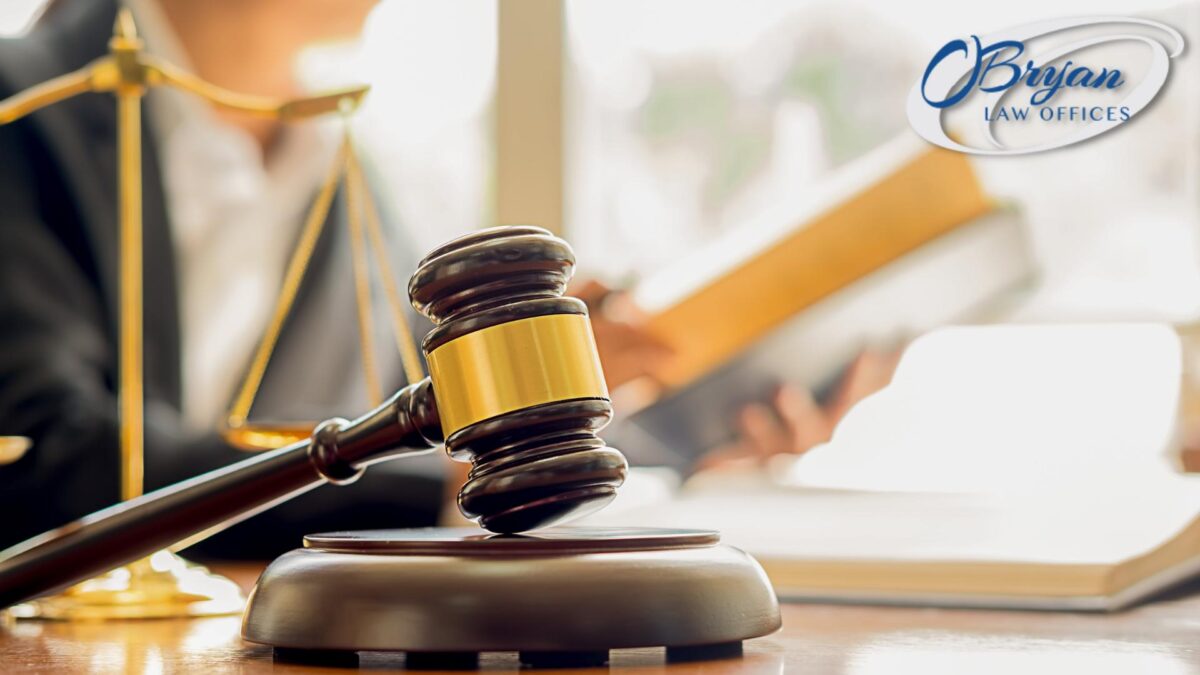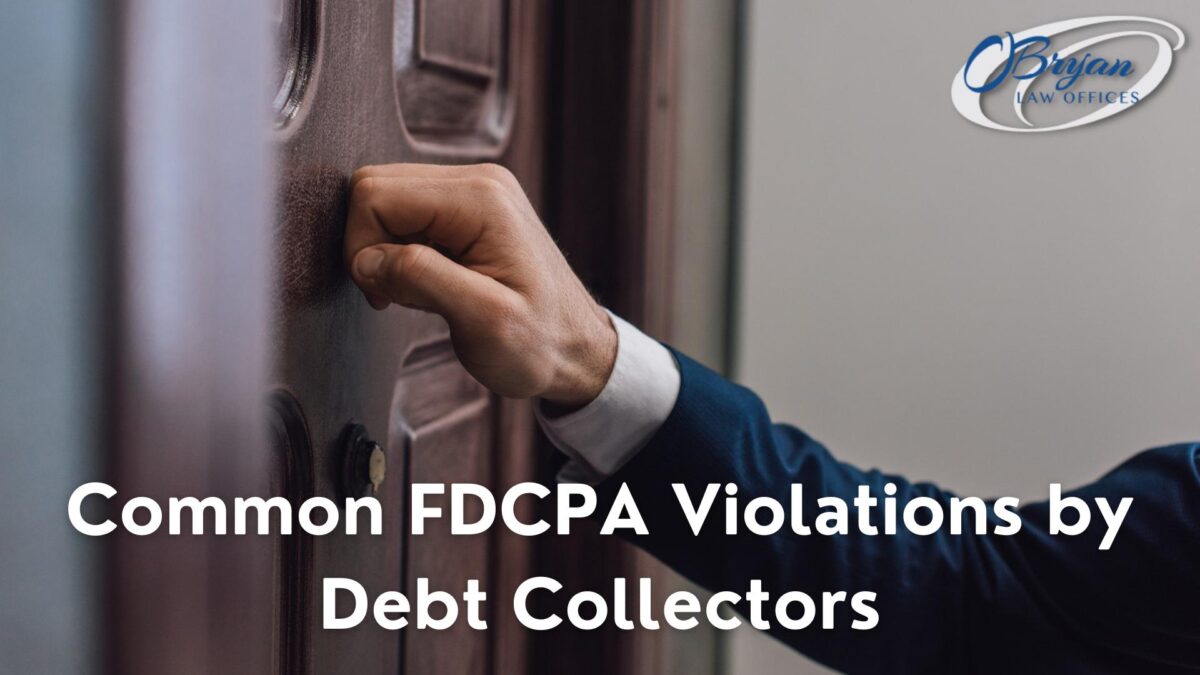When a person accrues debt, there are specific guidelines that debt collectors must follow according to the Fair Debt Collection Practices Act (FDCPA). This federal law protects consumers from harassment by debt collection agencies and outlines the penalties if debt collectors commit FDCPA violations.
At the O’Bryan Law Offices, our experienced attorneys understand how stressful it can be when you’re dealing with debt collectors, especially when they’re harassing you and using abusive tactics to collect their money. According to the FDCPA, individuals who believe debt collectors are harassing them may report the agency or collector to the Federal Trade Commission (FTC). Consumers also have the right to file a lawsuit against the debt collector if their case is strong enough.
To learn more about the legal options you can take against a harassing debt collector, contact the O’Bryan Law Offices by calling 502-339-0222 today.
What Is the Fair Debt Collection Practices Act (FDCPA)?
The Fair Debt Collection Practices Act (FDCPA) is the federal law that dictates debt collection practices. President Jimmy Carter signed it into law to protect consumers and prohibit abusive, deceptive, or unfair actions to collect. The FDCPA does not include business debts or cover the debt collection actions made by the original creditor or business you initially owed money to. Debt collectors included under the FDCPA are collection agencies, lawyers, and debt buyers.
The Consumer Financial Protection Bureau (CFPB) is the government agency that enforces the FDCPA. They are also responsible for investigating FDCPA violations and can help individuals resolve any problems with debt collectors who have violated this federal law.
Once the CFPB has received a complaint, they will tell the debt collector and work with both parties to find a solution. In addition to the CFPB, the Federal Trade Commission (FTC) is also responsible for regulating debt collectors’ actions and violations of the FDCPA.
While debt collectors must follow the FDCPA guidelines, they still often violate this federal law. In fact, the CFPB received almost 122,000 debt collection complaints in 2021.
What Are the Most Common FDCPA Violations by Debt Collectors?

Even though debt collectors must follow the Fair Debt Collection Practices Act, they still use tactics that are illegal to collect their debts. The FDCPA provides guidelines for debt collectors, including times they can call, their language, and how they present themselves. If you’re being harassed by a debt collector that is using one of the following actions, they’re committing FDCPA violations.
Continuing to Attempt Debt Collection
Borrowers who have paid off debts or never owed the debt, to begin with, are often continuously harassed by debt collection agencies. Once the debt has been paid, creditors can no longer contact the borrower. If the individual never owed the debt, getting the debt collection agency to stop calling can feel almost impossible.
The most common reasons that debt collectors contact people regarding debts they don’t owe are:
- Debtor was misidentified.
- Individual was the victim of identity theft.
- Debt has been paid off.
- Debt was discharged as a result of bankruptcy.
If you’re receiving phone calls from debt collectors for a debt you don’t owe, it’s essential to check your credit report. When you notice a debt that is not yours, report it to the credit reporting agency immediately.
Failing to Send a Debt Validation Notice
Debt collection agencies must send a written debt validation letter to the borrower. If they do not send out a written debt validation notice that includes the amount of debt owed, the name of the creditor, and the consumer’s rights, they can dispute the debt within a 30-day period.
Even if you received a written debt validation notice, but it was vague, you can request more information from the debt collector. You can dispute the debt if the additional information they provide needs to be corrected.
Unethical Communication Methods
Debt collector calls can be reported if they make threatening statements or use obscene or profane language.
Threatening Illegal Actions
Debt agencies are guilty of FDCPA violations if they threaten to sue an individual for a debt that is too old with expired statutes of limitations. They are also not allowed to threaten garnishing wages or to take a person’s property or home.
The following are statements that debt collectors have been known to make that are in violation of the FDCPA.
- Threats that they will damage your credit
- Threat to sue over an old debt that is past the statute of limitations
- Attempting to sue without properly notifying the borrower
- Threats of arresting an individual
- Attempting to garnish wages
- Threats and/or attempts to seize property
Making False Statements
Debt collection agencies have misrepresented themselves in the past and either stated or implied that they were a law firm. Some have also been known to try to collect more money than a person owes.
Sharing Information Without the Debtor’s Permission
Debt collectors cannot tell a third party about a consumer’s debt without their written permission. However, they can share the following information without written permission.
- Creditor
- Creditor’s attorney
- Credit reporting agency
- Consumer’s spouse
- Creditor’s parents (if they’re a minor)
Making Excessive Phone Calls
Many consumer complaints involved excessive phone calls from debt collectors. Many debt collectors will call people multiple times a day. The most common FDCPA violations regarding phone calls are:
- Constantly calling
- Continuing phone calls after the individual requested that the debt collector stop calling them
- Using profane or obscene language
- Phone calls occurring outside the legal calling hours or made at unusual times. Legal calling hours are 8 am to 9 pm local time.
What Are Your Options if a Debt Collector Violates the FDCPA?

The Fair Debt Collection Practices Act was enacted to protect consumers from harassing debt collector calls and other threatening or abusive debt collection actions. If debt collectors are harassing you, you have options available to report them for FDCPA violations.
Sue Them in State Court or Small Claims Court
One option consumers can pursue against debt collectors violating the FDCPA is to sue them in state court. For this lawsuit, you must provide evidence showing the debt collector violated the FDCPA. A successful case may result in $1,000 in statutory damages and more depending on if you suffered harm.
If you’re considering taking legal action against harassing debt collectors, contact the attorneys at the O’Bryan Law Offices. It’s important to note that to file a lawsuit against a debt collector, the FDCPA claim must be made within one year from the date the violation occurs.
Individuals that don’t have the time for a state court lawsuit can also file legal action in small claims court. This legal process doesn’t require an attorney and allows individuals to argue their case in one short court hearing. Once you’ve filed the court document, your hearing is usually held within two months. The judge will either give you their ruling during the hearing or mail you the verdict later. Small claims court cases have one disadvantage: they limit the amount of damages you can recover.
Report Them to the Federal Trade Commission
As mentioned above, the Consumer Financial Protection Bureau (CFPB) and the Federal Trade Commission (FTC) monitor debt collectors’ actions and ensure they are not violating the FDCPA. Anyone who believes a debt collector violates the FDCPA can contact the Federal Trade Commission and file an online complaint.
If you wish to submit a complaint with the Consumer Financial Protection Bureau, you can submit an online form on their website.
Report Them to Your State Attorney General
A debt collector that is in violation of the FDCPA may also be in violation of state laws. You can contact the state Attorney General’s office to learn about pursuing a lawsuit against the debt collector. It’s essential to report a debt collector that is violating the FDCPA because if they receive enough complaints about a particular debt collector, they may pursue a lawsuit against them on the state’s behalf.
Use This to Your Advantage in Settlement Negotiations

When borrowers are trying to settle their debts and the debt collector violates the FDCPA, they can use this as leverage when trying to settle the debt. Many debt collectors know how expensive an FDCPA lawsuit is and that they often result in judgments against them.
If you believe a debt collector has violated the FDCPA, contact the experienced attorneys at the O’Bryan Law Offices. We will evaluate how strong of a case you have and gather evidence proving the debt collector violated the act. Evidence that can strengthen your case is records of multiple telephone calls, copies of letters, testimony from witnesses, and more. The more evidence you have, the stronger your lawsuit will be.
Contact O’Bryan Law Offices Today
Struggling to pay off debt is stressful enough without the constant hounding of debt collectors reminding you of the money owed. Debt collectors’ strategies often violate the FDCPA even though they’re governed by the Federal Trade Commission (FTC) and the Consumer Financial Protection Bureau (CFPB). If you believe that a debt collector is violating the FDCPA, you have legal options to take action against the debt collector.
To learn more about filing a lawsuit against the debt collector or the other options available that you can take against a harassing debt collector, contact the O’Bryan Law Offices. Our experienced Kentucky bankruptcy attorneys will evaluate your case to determine the legal recourse. Schedule a free consultation with the attorneys at the O’Bryan Law Offices by calling 502-339-0222 today.







